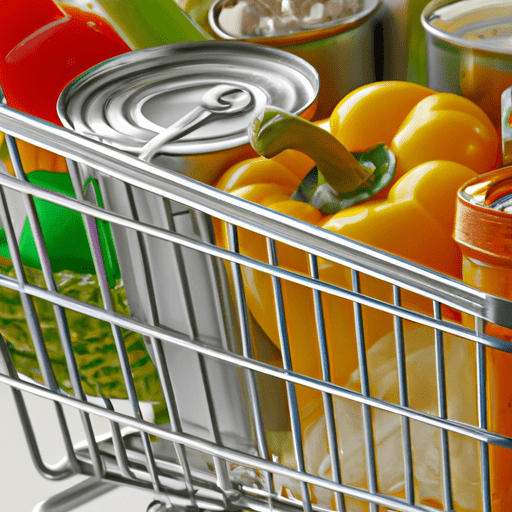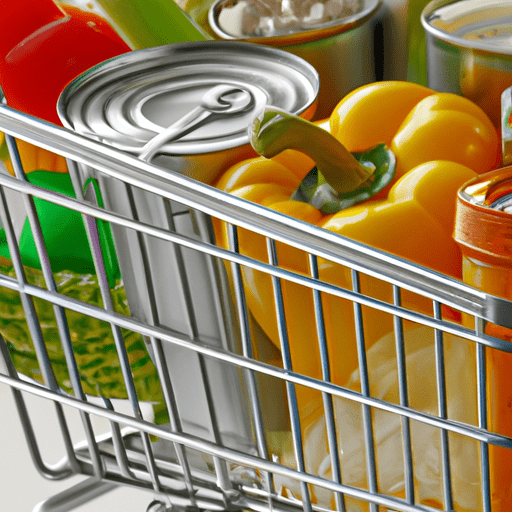How to Save Money on Groceries 2023: Top 10 Tips Revealed
In “How To Save Money On Groceries 2023,” you will discover practical tips and strategies to help you save money on your grocery shopping. This article takes a unique perspective, exploring the Catholic viewpoint on money-saving techniques for grocery shopping in the year 2023.
With rising costs and the ever-increasing importance of budgeting, these insights offer valuable guidance to navigate the grocery aisles without breaking the bank. Whether you’re looking for ways to optimize your shopping trips or seeking inspiration for delicious and economical meals, this article has got you covered. So, let’s dive into the world of grocery savings from a Catholic perspective in the upcoming year.
Meal Planning
Meal planning is an effective strategy to save money on groceries. By planning your meals for the week, you can avoid the temptation of buying unnecessary items and ensure that you only purchase what you need. Take some time at the beginning of each week to decide on the meals you want to prepare. Consider your schedule, dietary preferences, and any ingredients you already have on hand. Planning your meals in advance can also save you time and reduce stress during the busy week ahead.
Plan your meals for the week
When planning your meals, think about incorporating a variety of proteins, carbohydrates, and vegetables for a balanced diet. Consider using ingredients that are versatile and can be used in multiple dishes, such as chicken breast, pasta, or beans. Take into account any dietary restrictions or preferences of the people you are cooking for. Look for recipes that use similar ingredients to minimize waste and maximize your grocery budget.
Create a grocery list based on your meal plan
Once you have planned your meals, create a detailed grocery list. Go through each recipe and write down the specific ingredients you need to purchase. Check your pantry and fridge to see if you already have some of the items on your list. This will help you avoid buying duplicates and prevent food waste. Organize your list by sections like produce, dairy, meat, and pantry items to make your shopping trip more efficient.
Stick to your grocery list
When you go to the grocery store, it’s crucial to stick to your list. Avoid wandering through the aisles and picking up items that are not on your list. Impulse purchases can quickly add up and derail your budget. Stay focused on the items you need for your planned meals, and resist the temptation to buy unnecessary snacks or treats. By sticking to your grocery list, you will not only save money but also reduce food waste and encourage healthier eating habits.
Shop with a Budget
Creating and adhering to a grocery budget is a fundamental aspect of saving money on groceries. By setting a budget, you can prioritize your spending and make informed decisions about where to allocate your funds. Consider factors such as your income, family size, and dietary needs when determining your grocery budget.
Set a grocery budget
Take some time to review your monthly expenses and determine how much you can realistically allocate to groceries. Be honest with yourself and consider any financial goals you may have, such as saving for a vacation or paying off debt. Set a specific dollar amount for your grocery budget and challenge yourself to stick to it each week. Tracking your spending and adjusting your budget as needed can help you stay on track.
Use cash or debit instead of credit cards
Using cash or a debit card for your grocery purchases can help you stay within your budget. It’s easy to overspend when using a credit card, as the payment is deferred and the impact on your budget may not be immediately noticeable. By using cash or a debit card, you are limited to spending only what you have allocated for groceries, making it easier to stay within your budgetary constraints.
Consider buying in bulk
Buying certain items in bulk can be a cost-effective strategy. Non-perishable items like rice, pasta, canned goods, and cleaning supplies can often be purchased in larger quantities at a lower cost per unit. This can result in long-term savings, especially for items that you use frequently. However, be mindful of expiration dates and only buy in bulk if you are confident that you will be able to use the items before they spoil.

Compare Prices
Comparing prices at different stores is a valuable technique for saving money on groceries. Prices can vary significantly between retailers, so taking the time to compare prices can help you identify the best deals and maximize your savings.
Check prices at different stores
Before making your grocery purchases, it’s worth checking prices at multiple stores in your area. Use weekly flyers or online resources to compare prices for the items on your grocery list. While it may require some extra time and effort, visiting different stores for specific items can help you save money. Some stores may have lower prices on produce, while others may offer better deals on meat or pantry staples.
Take advantage of sales and promotions
Keep an eye out for sales and promotions at your local grocery stores. Many stores offer weekly or monthly discounts on certain items. Plan your meals and shopping trips around these promotions to take advantage of the reduced prices. It’s also helpful to sign up for store loyalty programs, as they often provide additional savings and exclusive discounts for members.
Consider generic or store brands
When comparing prices, it’s important to consider generic or store brands as an alternative to name-brand products. Generic brands often offer similar quality at a lower cost. Compare the ingredients and nutritional information to ensure that the generic brand meets your needs. Trying out generic brands can help you save money without compromising on the quality of your groceries.
Use Coupons and Vouchers
Coupons and vouchers can be valuable tools for saving money on groceries. By using them strategically, you can reduce your grocery bill and keep more money in your pocket.
Look for coupons in newspapers and magazines
Traditional sources such as newspapers and magazines often contain coupons for grocery items. Take some time to go through these publications and clip coupons for the products you regularly use. Organize your coupons in a wallet or folder so that you can easily access them while shopping. Pay attention to expiration dates and be mindful of purchasing items solely because you have a coupon. Only use coupons for products you would buy anyway.
Utilize online coupon websites or apps
In addition to traditional sources, there are numerous online coupon websites and apps that offer discounts on groceries. These platforms often provide digital coupons that can be loaded onto your loyalty card or accessed via your smartphone. Websites and apps like Coupons.com, Ibotta, and RetailMeNot are popular options for finding grocery coupons. Take advantage of these digital savings opportunities to reduce your grocery expenses.
Take advantage of loyalty programs
Many grocery stores have loyalty programs that offer exclusive discounts and rewards to members. Sign up for these programs to access additional savings on your purchases. Loyalty programs often provide personalized offers based on your shopping habits, so take advantage of any discounts tailored to your needs. Some programs also offer points or cash back on your purchases, allowing you to earn rewards that can be used towards future grocery expenses.

Shop Seasonal and Local
Shopping for seasonal and locally sourced produce can be an effective way to save money on groceries. These options are often more affordable than out-of-season or imported items, as they require less transportation and storage.
Buy produce when it’s in season
Produce that is in season tends to be more abundant and therefore less expensive. Fruits and vegetables that are grown locally and harvested at their peak tend to have better flavor and nutritional value. Familiarize yourself with the seasons of different fruits and vegetables, and plan your meals accordingly. Visit farmers’ markets or local grocery stores that support local farmers to find affordable and fresh seasonal produce.
Visit local farmers’ markets
Farmers’ markets are a great place to find fresh, locally grown produce at reasonable prices. These markets often offer a wide variety of fruits, vegetables, herbs, and other homemade products. By purchasing directly from farmers and local vendors, you can support the local economy and ensure that your money goes towards high-quality, sustainable food. Take advantage of the opportunity to speak with farmers and learn more about the origins of your food.
Join a community-supported agriculture (CSA) program
Community-supported agriculture programs (CSAs) allow consumers to purchase shares of a local farm’s harvest. By joining a CSA, you receive a regular supply of fresh, seasonal produce directly from the farm. CSA shares are often more affordable than buying the same produce individually. In addition to the cost savings, being part of a CSA promotes a sense of community and connection to the source of your food.
Reduce Food Waste
Reducing food waste is not only environmentally responsible but can also save you money. By making a conscious effort to minimize waste, you can stretch your grocery budget further and make the most of the food you purchase.
Plan meals using leftovers
Leftovers can be a valuable resource when it comes to meal planning. Instead of letting them go to waste, incorporate leftovers into future meals. For example, if you have leftover roasted chicken, use it in a stir-fry or a salad the next day. Get creative and look for ways to repurpose leftovers to avoid tedious repetition and keep your meals exciting.
Freeze leftovers for future meals
If you have more leftovers than you can use immediately, consider freezing them for later use. Invest in quality food storage containers or freezer bags to properly store leftovers in the freezer. Label each container with the date and contents to keep track and avoid confusion. Frozen leftovers can be easily reheated and enjoyed on busy days when you don’t have time to cook.
Use all parts of fruits and vegetables
Get creative with using all parts of the fruits and vegetables you purchase. For example, use vegetable scraps to make homemade vegetable stock instead of buying pre-packaged stock. Use citrus peels to make zest or infuse flavor into dishes. Don’t discard wilting herbs; turn them into pesto or blend them into salad dressings. By utilizing the entirety of the produce, you maximize your investment and minimize waste.

Avoid Impulse Buys
Impulse buys can quickly derail your grocery budget. By being mindful and intentional while shopping, you can avoid unnecessary purchases and save money.
Stick to your grocery list
We’ve mentioned this before, but it’s worth repeating: sticking to your grocery list is crucial. When you shop with a list, you have a clear plan and can resist the temptation to buy items on impulse. Avoid unnecessary detours through aisles that contain tempting treats or items that aren’t on your list. Refrain from adding items to your cart that are not essential for your planned meals.
Avoid shopping when hungry
Shopping on an empty stomach can be a recipe for impulse buys. Hunger can cloud your judgment and make everything at the grocery store seem irresistible. Eat a snack or a meal before heading to the store to help curb your hunger and prevent impulsive purchases. Shopping on a full stomach will allow you to make more rational decisions based on your meal plan and budget.
Don’t be tempted by flashy packaging
Attractive packaging and flashy marketing tactics are designed to catch your attention and entice you to buy. Don’t be swayed by appearances alone. Take the time to read the product labels and compare prices to ensure that you’re getting the best value for your money. Focus on the quality and ingredients rather than the packaging. By avoiding unnecessary marketing tricks, you can make more informed decisions and save money on your groceries.
Cook at Home
Eating out frequently can quickly drain your wallet. By cooking at home more often, you can save money and have more control over the ingredients and nutritional value of your meals.
Eat out less frequently
While it’s enjoyable to dine out occasionally, eating out too frequently can have a significant impact on your budget. Make a conscious effort to reduce the number of meals you eat at restaurants or order takeout. Instead, prioritize cooking and enjoying meals at home. Set realistic goals, such as cooking at least four to five times a week, and gradually increase as you become more comfortable in the kitchen.
Learn to cook simple and nutritious meals
Cooking at home doesn’t have to be complicated or time-consuming. There are plenty of simple and nutritious recipes available online and in cookbooks. Invest in basic cooking utensils and ingredients, and gradually expand your culinary skills. Start with easy-to-follow recipes and gradually challenge yourself to try new dishes. Not only will you save money, but you’ll also develop valuable cooking skills that can benefit you for a lifetime.
Pack your own lunches
Packing your own lunches can significantly reduce your food expenses. Instead of buying pre-made meals or eating out during lunch breaks, prepare your lunches at home. Leftovers from dinner can make excellent packed lunches for the following day. Consider investing in reusable food containers and lunch bags to make it easier to transport your homemade meals. Packing your own lunches also allows you to make healthier choices and avoid the temptation of unhealthy fast food options.
Grow Your Own Food
Growing your own food is an excellent way to save money and enjoy the satisfaction of harvesting your produce. Even if you don’t have a large yard or a green thumb, there are many options for growing your own food.
Start a vegetable garden
If you have a yard, consider starting a vegetable garden. Choose vegetables that are relatively easy to grow and suited to your region’s climate. Tomatoes, lettuce, herbs, and beans are popular choices for beginners. Research the best planting and care practices for each crop to increase your chances of success. Starting a vegetable garden not only saves money but also provides you with fresh, organic produce right at your doorstep.
Grow herbs on your windowsill
If you don’t have access to a yard or a garden, growing herbs on your windowsill is a great alternative. Many herbs can thrive indoors with minimal space and care. Basil, parsley, mint, and rosemary are just a few examples of herbs you can grow indoors. Fresh herbs can be an expensive addition to your grocery bill, so having them readily available at home can provide significant savings and enhance the flavors of your homemade meals.
Consider fruit trees or berry bushes
If you have a larger yard, consider planting fruit trees or berry bushes. Apples, peaches, and pears are relatively easy to grow and can provide a bountiful harvest. Similarly, raspberries, blueberries, and strawberries can thrive in many climates. Keep in mind that trees and bushes may take a few years to produce fruit, so patience is key. Growing your own fruit not only saves money but also enables you to enjoy the freshest and most flavorful produce.
Plan for Leftovers
Intentionally planning for leftovers can save you time and money. By cooking in larger batches and repurposing leftovers, you can stretch your meals further and reduce food waste.
Cook in larger batches
When preparing meals, consider making larger portions than you need for a single meal. Cooking in larger batches allows you to have leftovers for future meals. For example, if you’re making spaghetti sauce, make a double batch and freeze the extra portion for another day. By investing a little extra time upfront, you can have ready-made meals available in your freezer, which can come in handy on busy nights.
Repurpose leftovers into new meals
Instead of eating the same meal repeatedly, get creative and repurpose your leftovers. Leftover roasted chicken can be shredded and used in sandwiches or salads. Unused grilled vegetables can be incorporated into omelets or added to pasta dishes. Experiment with different flavor combinations and turn your leftovers into something new and exciting. This not only reduces food waste but also helps you save money by making the most of the ingredients you already have.
Pack leftovers for work or school lunches
Leftovers make excellent packed lunches for work or school. Instead of spending money on pre-packaged meals or eating out, pack your leftovers in reusable containers and bring them with you. Not only does this save you money, but it also ensures that you’re consuming a nutritious meal during the day. Invest in a good-quality lunch bag or container to keep your leftovers fresh and tasty.

In conclusion, saving money on groceries requires a combination of planning, budgeting, and strategic shopping. By implementing these tips and strategies, you can make the most of your grocery budget, reduce food waste, and enjoy delicious, homemade meals. Remember to plan your meals, stick to your grocery list, compare prices, use coupons, shop seasonal and local, reduce food waste, avoid impulse buys, cook at home, grow your own food, and plan for leftovers. With a little effort and conscious decision-making, you can achieve significant savings without sacrificing the quality or nutrition of your meals. Happy grocery shopping!






